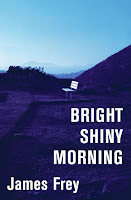 I’m going to start off my review by confessing a number of things:
I’m going to start off my review by confessing a number of things:
1. I work for the company that published Bright Shiny Morning.
2. I came down hard on the side of Frey over the whole Oprah debacle.
3. I did not read My Friend Leonard, but loved A Million Little Pieces.
4. I believe Frey to be an extremely talented writer.
Now with all of that out of the way, I think it’s important also to note that it’s impossible to read Bright Shiny Morning outside of the context of what happened to its author. The characters are all deeply scarred by life, by their own actions and by the harsh nature of the world in general. That’s as far as I’ll go in terms of imprinting an author’s psyche onto his work.
When I started the novel on Friday evening on the subway ride home, I wanted to ignore the world and simply read it until I was finished. Lucky for me, my RRHB had to work on Saturday so I did not leave my room until I had read all 501 pages. And the thank yous. And my first thoughts upon finishing the book was not unlike what Thom Geier over at Entertainment Weekly opined. Once done, I said to myself, “Huh, where’s the story?”
I got out of bed, pulled the covers up, tidied the pillows, sat back down and decided I was all wrong in my thinking. It’s not so much where’s the story but what’s the story. And the city is the story. The book is Los Angeles. From its beginnings (told in chronological order in parallel to the various stories that have physical characters in them) to its current state: polluted, prolific, rich, brilliant, troubled, lost, found and a whole host of other descriptors pregnant with meaning. Throughout the novel, there are 4 key storylines that thread the book together, that break through the setting (which includes many, many other characters, which go beyond their usual narrative importance and simply become setting themselves) and hold the book together: a young couple that leave abusive homes to find their fortune in LA; an American-born Mexican girl struggling to find her way; a closeted superstar with a functional marriage and dysfunctional obsessions; and a homeless man who lives near Venice Beach in a bathroom.
Frey’s unique writing style, his lack of punctuation, his driving, aching prose, reaches out off the page and right into your emotional core. When life collapses all around the characters, as it does, Frey’s ability to convey the events that cause their downfalls is matter of fact. Not without emotion, but with a driving honesty that enables one to come to grips with the sheer force of unhappiness in all its glory. That’s not to say there aren’t happy parts to the book, but there’s a lot of realistic unhappiness too, as if he’s taking the Hollywood dream and showing it from every angle the cameras won’t capture. It’s as if he’s taken the idea of honesty and pulled it apart, driven it to new heights, and then broken it all apart again just to make sure we get it.
And we do, get it.
By the end of the book, I felt despite the cliches (and there are some, they are unavoidable), despite the slightly frustrating epic-like lists, and despite my own craving for more about the 4 main stories, I closed the cover extremely satisfied. Satisfied in the sense that there are many writers trying to push the boundaries of fiction and the form of the novel, but none who can do it so publicly as Frey. His name will push the novel onto the bestseller list, but his work will show everyone what he’s got in him: a tenacious ability to tell a good tale and a need to drive the form of the novel itself in a new direction.
I got up off the bed again, stripped off my pajamas, had a shower, and decided that yes, it’s a freaking good book. My thoughts now far more in line with what the NY Times had to say. And I’d highly recommend it to anyone who asks, and I still think Oprah was a fool over it all.




